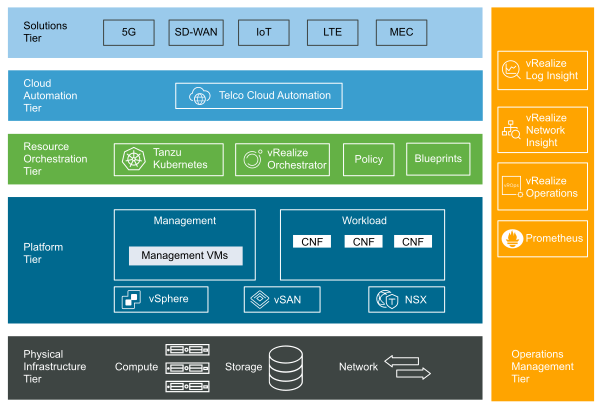The Architecture Overview section describes the high level physical and virtual infrastructure; compute, networking, and storage elements in this Telco Cloud Platform 5G reference architecture.

- Physical Tier
-
Represents compute hardware, storage, and physical networking as the underlying pool of shared resources.
- Platform Tier
-
The lowest tier of Telco Cloud Platform. It provides the virtualization run-time environment with network functions and resource isolation for VM and container workloads. Virtualized compute, storage, and networking are delivered as an integrated solution through vSphere, vSAN, and NSX-T Data Center. Isolated resources and networks can be assigned to a tenant slice, which is a runtime isolated partition delivering services. Tenant slices can be dedicated to a tenant or shared across tenants. This architecture is optimized and adjusted for telco-class workloads to enable the delivery of quality and resilient services. Infrastructure high availability, performance, and scale considerations are built into this tier.
- Resource Orchestration Tier
-
Provides resource management capabilities to the Platform tier. The resource orchestration tier controls, manages, and monitors the compute, storage, and network hardware, software for virtualization layer, and virtualized resources.
- Cloud Automation Tier
-
Provides service management and control functions that bridge the virtual resource orchestration and physical functions to deliver services and service chains. It is typically a centralized control and management function, including embedded automation and optimization capabilities.
- Solutions Tier
-
The multi-domain ecosystem of software Virtual Functions and Container Functions. Complex solutions are composed of such functions to enable service offers and business models that CSPs consume. Solutions differ based on their needs. Example solutions are Multi-Access Edge Computing (MEC) and a fully evolved packet core.
- Operations Management Tier
-
An integrated operational intelligence for infrastructure day 0, 1, and 2 operations that spans across all other tiers. The functional components in the operations management tier provide the topology discovery, health monitoring, alerting, issue isolation, and closed-loop automation.